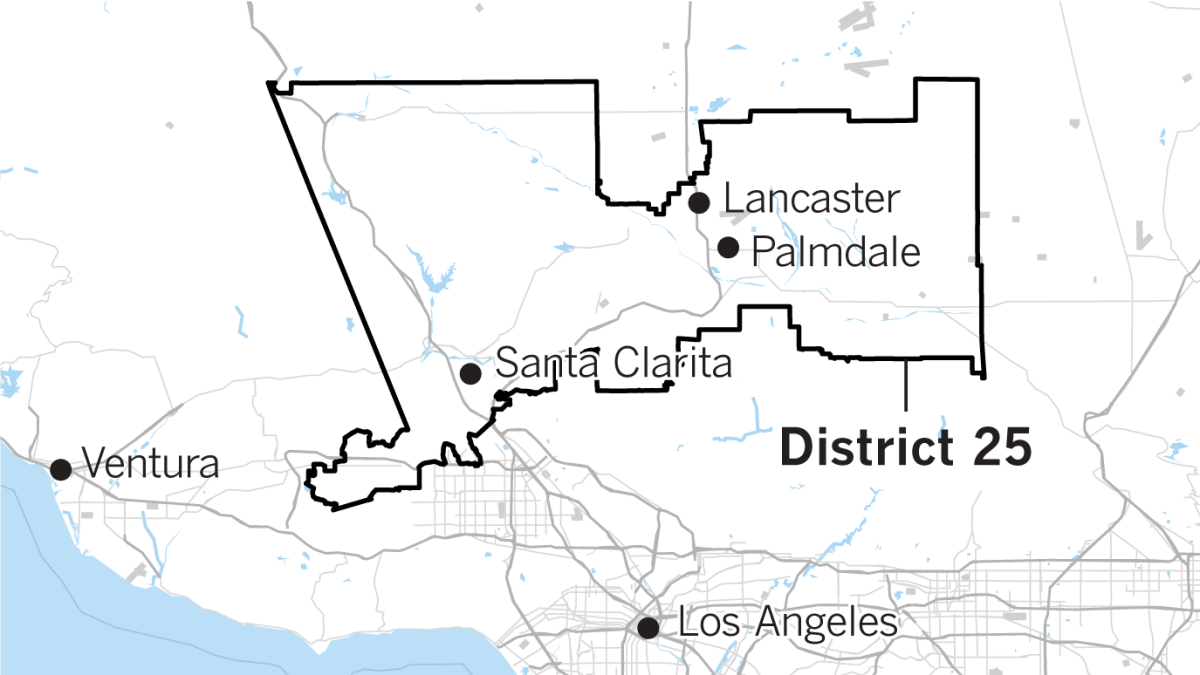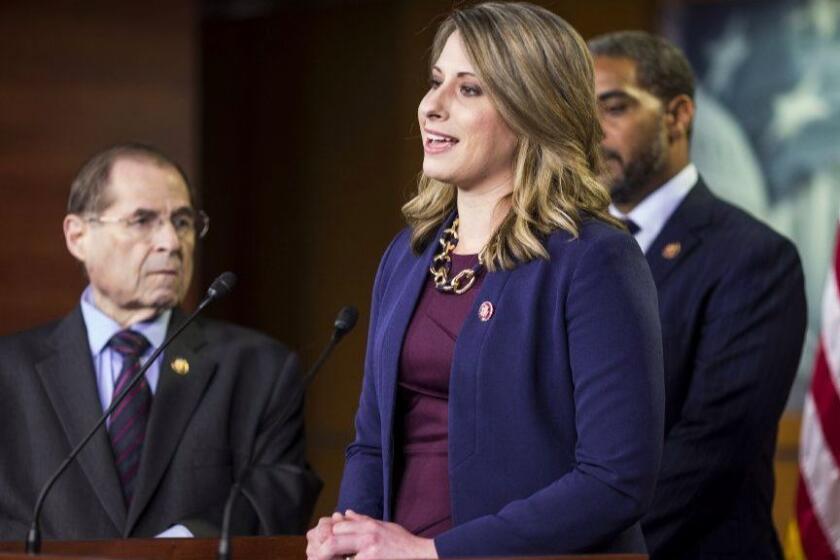Q&A: What you need to know about the fall of Democratic rising star Rep. Katie Hill

Katie Hill’s meteoric congressional career is coming to an abrupt end. The freshman Democrat from Santa Clarita announced Sunday she would resign amid publication of nude photos of her and allegations that she had romantic relationships with congressional and campaign subordinates.
She has acknowledged having a relationship with a campaign staffer but denies having had one with a congressional aide. In a video statement Monday, she blamed her estranged husband and a campaign by “the right-wing media and Republican opponents” for the allegations against her.
Her fall comes less than a year after she was elected to Congress in a district long held by the GOP, and now Republicans see a chance to win back the seat.
Here is what you need to know:
Who is Katie Hill?
Hill, 32, a rising star in the Democratic Party and a protege of House Speaker Nancy Pelosi, was one of the highest-profile freshmen elected during the 2018 midterm wave, which gave Democrats control of the House of Representatives.
Hill flipped a Republican seat on the northern edges of Los Angeles, defeating two-term incumbent Steve Knight with much help from volunteers who flooded to support her campaign and from rising progressive entities including Swing Left and Crooked Media. Her supporters included actress Kristen Bell.
Before running, Hill was one of the top executives at PATH, a Los Angeles nonprofit that supports the homeless.
How did the controversy start?
On Oct. 10, the conservative website RedState published a story with comments from Hill’s husband, Kenneth Heslep, who filed for divorce this year, alleging his wife was having a romantic affair with her congressional legislative director, Graham Kelly. Hill has denied that allegation.
But the scandal didn’t truly blow up on social media until RedState published a follow-up story on Oct. 18 alleging that Hill, who is bisexual, and her husband had a three-way relationship with a campaign staffer, who was not identified. RedState published photos it had been given of Hill with the female staffer and said it had more “intimate photographs of the women, which we have chosen not to publish.” RedState alleged that the existence of the photos could put Hill at risk of blackmail. The British tabloid the Daily Mail also published sensitive photos of Hill.
The California Democrat denied the allegations but acknowledged she had been involved in a separate relationship with a member of her campaign staff.
What are the rules?
New House ethics rules, adopted last year, forbid members from having sexual relationships with their staff. House investigators have also previously found that inappropriate sexual advances on campaign staff constitute a violation of House ethics rules, noting that “service as an elected official involves power imbalances that members must be careful not to exploit.” The House Ethics Committee said last week that Hill was under investigation.
In the workplace, relationships between supervisors and subordinates are generally strongly discouraged, often because they raise questions about the subordinate’s ability to consent and because they can create actual or apparent conflicts of interest if the employee receives other professional favors or unusual treatment.
Those principles were highlighted in divorce records reviewed by The Times, in which Heslep said that Hill had used her influence to get him jobs at PATH between 2011 until 2014. At one point, Hill’s “employer was concerned about nepotism and how it looked that she was my boss,” Heslep said in the filing.
Heslep later rose to a regional management position and implied that his position was the result of favoritism by Hill. “I only have a high school diploma but I was able to get this job primarily because of [Hill’s] influence,” Heslep wrote in his divorce filing. “I did not have any special qualifications for these jobs.”
Heather Wilson, a spokeswoman for PATH, said in a statement: “We have a conflict of interest policy that covers employees and their family members. Every potential employee is fully vetted for adherence in accordance with all of our policies before they are hired. There was no direct supervisory relationship between Hill and Kenny Heslep during the time periods they were employed at PATH.”
Heslep, who said he has been an unemployed stay-at-home husband since 2014, is seeking spousal support from Hill.
How did Hill respond?
Hill has acknowledged having had a relationship with the campaign staffer, but she has denied having a relationship with Kelly, calling the allegation “absolutely false.”
“I am saddened that the deeply personal matter of my divorce has been brought into public view and the vindictive claims of my ex have now involved the lives and reputations of unrelated parties,” Hill said in a statement last week.
Hill also said the explicit photographs of her with the campaign staffer had been “published by Republican operatives on the internet without my consent,” and she contacted U.S. Capitol Police.
On Sunday, Hill resigned, saying in a statement “this is what needs to happen so that the good people who supported me will no longer be subjected to the pain inflicted by my abusive husband and the brutality of hateful political operatives who seem to happily provide a platform to a monster who is driving a smear campaign built around cyber exploitation.”
Hill added: “Having private photos of personal moments weaponized against me has been an appalling invasion of my privacy. It’s also illegal, and we are currently pursuing all of our available legal options.”
Hill was the first female lawmaker to face sexual misconduct allegations in the wake of Congress’ reckoning with #MeToo, and the first to confront “revenge porn.”
Are the leaked photos illegal?
That’ll be up to prosecutors and the courts, if they get involved. Both California and Washington, D.C., have laws forbidding the malicious sharing of explicit images of someone without the person’s consent.
Washington’s statute forbids both the sharing and publication of explicit private images when the disclosure is nonconsensual and meant to inflict harm, but it includes an exclusion for when “the disclosure or publication of a sexual image is made in the public interest, including the reporting of unlawful conduct,” which would be a likely 1st Amendment defense for RedState.
California’s statute forbids the sharing of such images when “the person distributing the image knows or should know that distribution of the image will cause serious emotional distress, and the person depicted suffers that distress.” The state exempts distribution “made in the course of reporting an unlawful activity.”
What about Hill’s seat?
A Democratic California assemblywoman, Christy Smith, has already announced plans to run to replace Hill in California’s 25th Congressional District.

Latino Victory, an advocacy group, said in a tweet that “we look forward to recruiting and supporting a strong Latino Democrat to run & once again win this seat in 2020.”
Several Republicans already had filed to challenge Hill. Knight, whom Hill beat by 9 percentage points in 2018, is considering a run and is expected to make an announcement soon.
Former Trump advisor George Papadopoulos hinted on Twitter that he was interested in running, writing: “Someone has to step up. I love my state too much to see it run down by candidates like Hill. All talk, no action, and a bunch of sell outs.”
Papadopoulos was sentenced to prison last year for lying to federal agents about his interactions with Russian intermediaries during the 2016 presidential campaign.
Times staff writer Seema Mehta contributed to this report.
More to Read
Get the L.A. Times Politics newsletter
Deeply reported insights into legislation, politics and policy from Sacramento, Washington and beyond. In your inbox three times per week.
You may occasionally receive promotional content from the Los Angeles Times.













